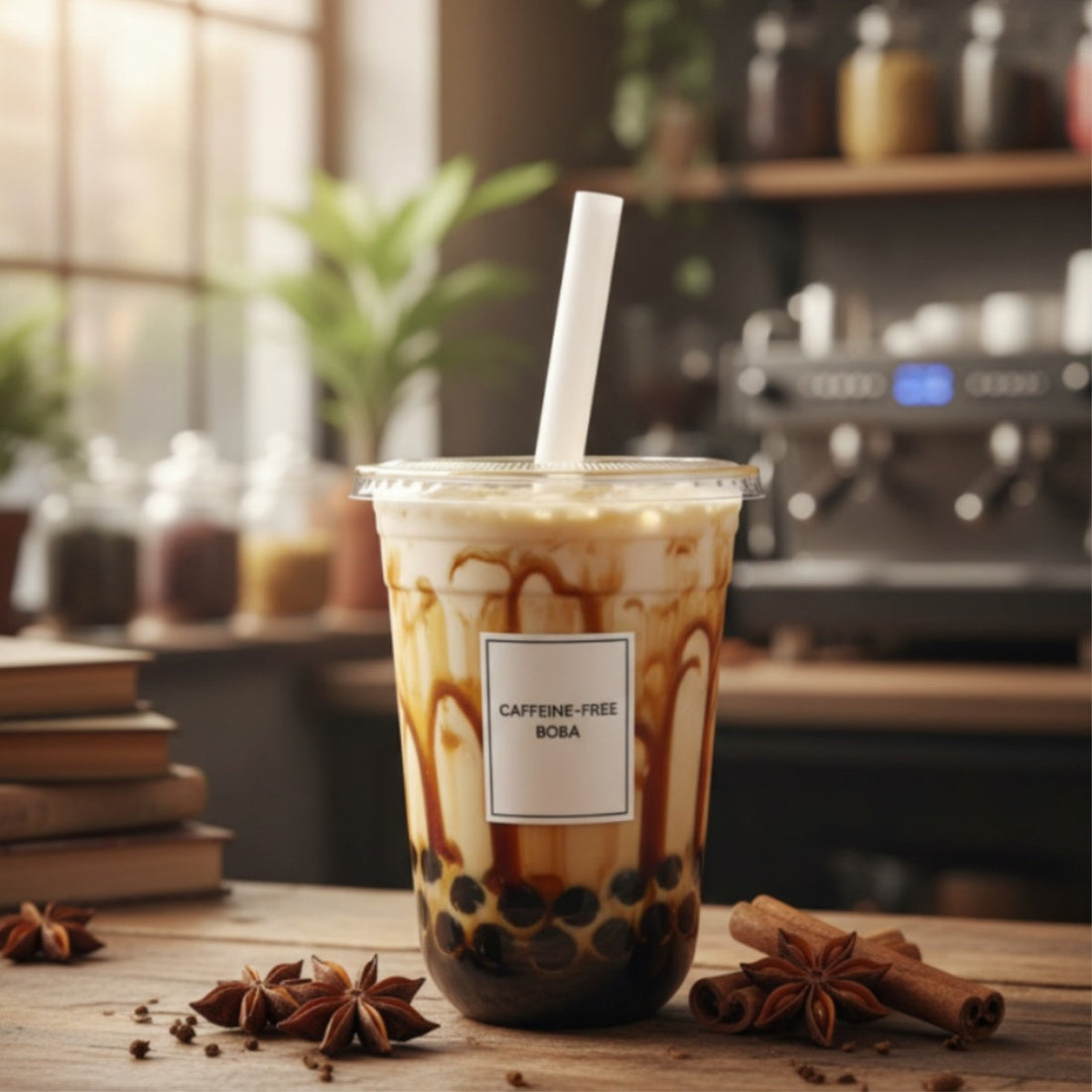Bubble tea, or boba, has become a mainstream sensation across the UK, from the bustling streets of London to local university towns. It’s a delicious, customisable treat, but a question we often hear at Bubble Crush is: "Does bubble tea have caffeine?"
The short answer is: Yes, most traditional bubble tea contains caffeine, but the level varies significantly.
As your trusted UK supplier of premium bubble tea ingredients and packaging, Bubble Crush is here to give you the complete breakdown. Understanding the source and the content is key to crafting your perfect cup, especially for those who are caffeine-sensitive or prefer a late-night treat.
The Primary Source: It’s All About the Tea Base
Unlike the common misconception, the caffeine in bubble tea does not come from the famous chewy tapioca pearls (boba). Tapioca pearls are made from the starch of the cassava root and are naturally caffeine-free.
The caffeine content is entirely dependent on the tea base used. Here’s a look at the three most common teas and their caffeine levels:
1. Black Tea (The Strongest Kick)
Common Use: Classic Milk Tea, Assam Milk Tea (a popular high-caffeine choice), and some Thai Teas.
Caffeine Content: Black tea contains the highest level of caffeine, typically ranging from 40 to 60 mg per standard 500ml serving.
The Bubble Crush Connection: Our premium Bubble Crush Black Tea leaves are specifically chosen for their robust, malty flavour that stands up beautifully to milk and sugar, providing that satisfying, gentle lift.
2. Oolong Tea (Highly Variable Content)
Common Use: Drinks that require a more complex, floral flavour profile.
Caffeine Content: Oolong sits between black and green tea, usually providing 30 to 50 mg per serving. Crucially, the caffeine level is highly variable based on the fermentation level and brewing time. Lightly oxidised oolong may have lower caffeine, while heavily roasted oolong can approach black tea levels.
Why Choose Oolong: Oolong tea offers a smoother, less aggressive caffeine curve and a more nuanced flavour—perfect for customers looking for something a bit different.
3. Green Tea (The Milder Boost)
Common Use: Fruit Teas, Jasmine Green Milk Tea, and often the base for Matcha
Caffeine Content: Green tea is generally the lowest in traditional caffeine, at around 20 to 30 mg per serving.
A Note on Matcha: Matcha (a powdered green tea) is an exception. Because you consume the entire tea leaf, a Matcha-based bubble tea can sometimes contain higher caffeine levels (closer to black tea).
|
Tea Base |
Average Caffeine per 500ml Serving |
Comparison |
|
Black Tea (Assam) |
40-60 mg |
Lower than a standard cup of coffee (approx. 95mg) |
|
Oolong Tea |
30-50 mg (Variable) |
Similar to a small energy drink |
|
Green Tea (Jasmine) |
20-30 mg |
Similar to a standard decaf coffee |
The Caffeine-Free Bubble Tea Alternatives

The beauty of modern bubble tea is that you can still enjoy the chewy texture and sweet flavours without any caffeine. Bubble Crush is proud to supply a wide array of ingredients that make crafting the perfect caffeine-free beverage easy for your business.
1. Naturally Caffeine-Free Bases
These are your safest bets for zero-caffeine drinks:
Winter Melon Tea (冬瓜茶): A beloved Taiwanese classic, Winter Melon tea is made from compressed winter melon and sugar blocks. It is 100% tea-free and caffeine-free, offering a unique, caramel-like sweetness and a highly refreshing profile.
Herbal Tea Bases: Use naturally caffeine-free herbal teas like Hibiscus, Rooibos, or Chamomile as the foundation for fruity or floral milk teas.
2. Milk-Only Drinks (No Tea Required)
Some of the most popular boba drinks worldwide contain no tea at all!
Brown Sugar Boba Milk (Tiger Sugar Style): This iconic drink uses cooked tapioca pearls simmered in a rich brown sugar syrup, then added to fresh milk. Zero tea base means zero caffeine!
Taro Milk: If made with our premium Bubble Crush Taro Powder and milk, this sweet, nutty, purple beverage is naturally caffeine-free and incredibly satisfying.
Flavoured Milk/Smoothies: Chocolate, caramel, or fruit smoothie bases combined with our Bubble Crush Syrups and boba pearls are perfect for a kid-friendly or late-night dessert option.
3. All the Toppings!
Remember, toppings like tapioca pearls, popping boba, and jellies are always caffeine-free. You can pack a drink full of texture and flavour without worrying about the stimulant.
Tips from Your Bubble Crush Supplier
For UK shops and home brewers looking to cater to the growing demand for low-caffeine and caffeine-free options, here are our expert tips:
Clearly Label Menu Options: Highlight drinks on your menu that are "Naturally Caffeine-Free" (e.g., Taro Milk, Brown Sugar Milk, Winter Melon Tea) or offer "Decaf Tea Base Available."
Stock Quality Alternatives: Ensure you have a reliable supply of versatile, caffeine-free powders and syrups. Bubble Crush offers a complete range of powders, including Taro and various fruit mixes, that blend perfectly with milk or water, entirely bypassing the need for a caffeinated tea base.
Train Your Staff: Educate your team on the caffeine content of your core ingredients. This allows them to confidently advise customers—from pregnant women to children—on the safest and most enjoyable options.
Conclusion: Customisation is Key

Bubble tea is all about customisation. While the classic milk tea certainly offers a moderate caffeine boost, the vast world of boba—especially with the high-quality, flexible ingredients supplied by Bubble Crush—means there is a perfect drink for every preference, energy level, and time of day.
By utilising the diverse raw materials from Bubble Crush, UK businesses and home enthusiasts can easily offer a comprehensive range, from high-energy black tea blends to refreshing, guilt-free, zero-caffeine treats.
Ready to offer the ultimate customisable boba menu? Explore our full range of teas, syrups, and caffeine-free powders today!

